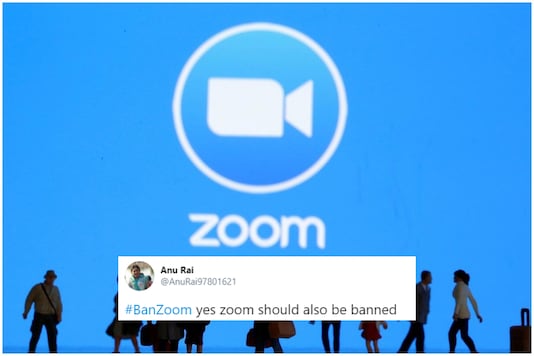Even as the Indian government banned 59 Chinese apps from being used in India including TikTok and ShareIt, many in India were left wondering if the video-calling app Zoom and the messaging app were also banned.
The ban was issued by the Ministry of Information Technology in the wake of rising Indo-China border tension in Ladakh which previously led to the killing of 20 Indian army soldiers in Galwan Valley late on the night of June 15. The incident led to a chorus of demands both on and off social and legacy media, calling for a ban on Chinese imports including products and apps.
Following the volley of boycott calls, the Indian government banned 59 Chinese apps. But some on social media were left unsatisfied as they called for a further ban on apps like Zoom.
btw India did not ban Zoom, the Chinese app that actually matters #indiabanschineseapps
— Waqas (@worqas) June 29, 2020
Zoom app bhi ban krdo please.
— Avni (@SubtleSass) June 29, 2020
Why some apps like #Zoom #pubgban are not banned yet.#Zoom is a big threat for privacy of our Country's sovereignty.
— Armaan Saini (@ArmaanS77722969) June 30, 2020
Merely ban these app is not sufficient
Govt should try to contact with Playstore to ensure that these app will not work if anyone has already downloaded it. pic.twitter.com/k4HCwjj9ph
Not just Zoom, Twitter users also called for a ban on gaming app PUBG, and messaging app WhatsApp.
But is Zoom a Chinese App?
Zoom rose to prominence amid the COVID-19 pandemic which necessitated the need for technology facilitating contact and communication while maintaining social distancing from within homes.
Since the increase in the number of Zoom users, several concerns regarding data privacy have been raised about issues such as its alleged sharing of data with Facebook, allowing meeting hosts and track attendees, and Zoom's initial refusal to implement end-to-end encryption.
But is Zoom a Chinese app?
The answer is - NO.
Zoom or Zoom Communications, Inc. is not a Chinese company at all but in fact, an American company founded by Chinese-American billionaire Eric Yuan. It is headquartered in San Jose, California and Yuan, who is also the CEO of Zoom, holds American citizenship.
This is not the first time that questions have been raised on whether Zoom is a Chinese app or has vested interests in China.
Earlier, Yuan had clarified to media that Zoom was a fully American app that was founded and headquartered in the US.
"Recently, questions have been raised about Zoom and China. At first, this seemed to stem from a temporary misconfiguration in our global data centre routing that we fixed," Yuan had said.
Despite clarifications, many in India continue to believe that Zoom is a Chinese app or may have vested interests in China. Such fears may be allayed by the fact that Zoom employs a large workforce in China. Doubts raised against alleged surveillance and censorship concerns following several lapses in design and security.
In fact, an advisory issued by the Government of India’s Cyber Coordination Center, or CyCord, in April suggested that individuals who may be using the Zoom app for personal usage or for official calls, should follow certain guidelines to make their video meetings safer. This followed warning by the Indian Computer Emergency Response Team (CERT-in) that Zoom is not a safe app to use.
Earlier, the Ministry of Home Affairs had made it clear that the Zoom app will not be used government officials.
The globally raised security concerns seemingly led the company to change its stance on adopting end-to-end encryption. Earlier in June, Zoom announced that it was going to be providing end-to-end encryption to both free and paid users.
Despite concerns, however, Zoom remains an American company and not one of the 59 Chinese apps that were banned.
While many in India were left disappointed with Zoom, which several schools and educational institutions have been utilising for conducting online classes, those in the know managed to have some fun on Twitter with memes.
ZOOM :- Guys I'm not Chinese App , I'm American
— Mridul Pal (@themridulpal) June 29, 2020
*le Students :-#Zoom_Ban pic.twitter.com/QED7HLVev9
Le students when they realise zoom didn't get ban and online class will continue. pic.twitter.com/C2YDPP2HlX
— beingcommerce (@being_commerce) June 30, 2020
Similar concerns have been raised about gaming app PUBBG and messaging app WhatsApp, which were also not banned. Here's the truth.
Neither PUBG not WhatsApp are owned by Chinese companies.
Developed by a man named Brendan Greene, who hails from Ireland, PUBG is a subsidiary of South Korean video game company Bluedot. It's China connection comes from Tencent Games, which is only the video game publishing partner of PUBG in China.
READ: Is PUBG a Chinese App? India-China Face-Off is Now Testing the Loyalty of Indian Gamers
Similarly, WhatsApp is owned by Mark Zuckerberg's Facebook, which is also an American company and despite security concerns about the app, it has nothing to do with China.










